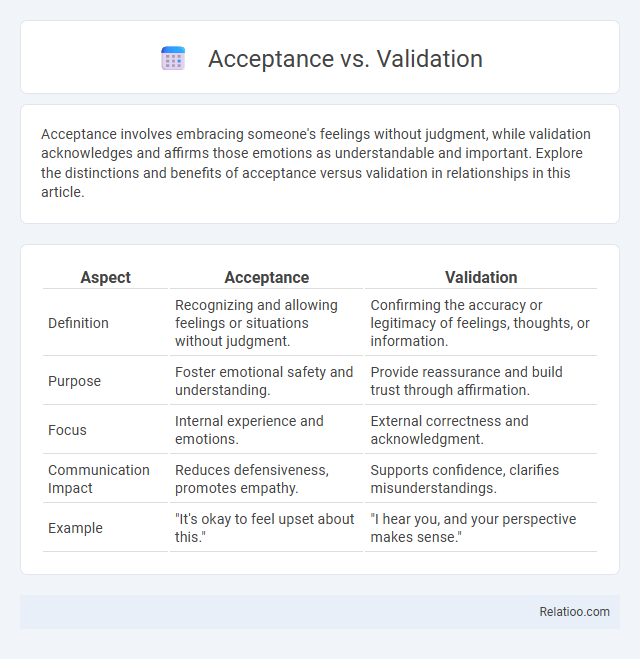Acceptance involves embracing someone's feelings without judgment, while validation acknowledges and affirms those emotions as understandable and important. Explore the distinctions and benefits of acceptance versus validation in relationships in this article.
Table of Comparison
| Aspect | Acceptance | Validation |
|---|---|---|
| Definition | Recognizing and allowing feelings or situations without judgment. | Confirming the accuracy or legitimacy of feelings, thoughts, or information. |
| Purpose | Foster emotional safety and understanding. | Provide reassurance and build trust through affirmation. |
| Focus | Internal experience and emotions. | External correctness and acknowledgment. |
| Communication Impact | Reduces defensiveness, promotes empathy. | Supports confidence, clarifies misunderstandings. |
| Example | "It's okay to feel upset about this." | "I hear you, and your perspective makes sense." |
Understanding Acceptance and Validation
Understanding acceptance involves recognizing and embracing emotions or situations without judgment, fostering emotional resilience and self-compassion. Validation entails acknowledging someone's feelings or experiences as genuine and important, enhancing connection and psychological safety. Differentiating acceptance from validation clarifies internal versus external processes: acceptance is self-directed, while validation is often interpersonal.
Key Differences Between Acceptance and Validation
Acceptance involves recognizing and allowing emotions or experiences to exist without judgment, whereas validation acknowledges and affirms the legitimacy of someone's feelings or perspectives. Acceptance is an internal process centered on your own emotional state, promoting self-compassion and resilience, while validation actively communicates understanding and support from others. Understanding these key differences enhances emotional intelligence and improves interpersonal relationships.
Psychological Foundations of Acceptance
Acceptance, rooted in psychological foundations, involves recognizing and embracing your thoughts and emotions without judgment, fostering emotional resilience and mental well-being. Validation acknowledges and affirms your feelings as real and understandable, helping to build trust and emotional safety in relationships. Differentiating acceptance from validation clarifies how internal self-embrace contrasts with external affirmation, both essential for holistic psychological health.
The Role of Validation in Emotional Well-being
Validation plays a crucial role in emotional well-being by acknowledging and affirming Your feelings without judgment, which fosters self-understanding and resilience. Unlike acceptance, which involves embracing experiences or emotions as they are, validation offers recognition that Your emotional responses are justified and real, enhancing connection and support. This process reduces emotional distress and promotes healthier coping mechanisms by reinforcing that Your feelings are legitimate and worthy of attention.
Acceptance in Relationships: Challenges and Benefits
Acceptance in relationships means embracing your partner's flaws and differences without trying to change them, which fosters emotional security and trust. Challenges include overcoming personal biases and resisting the urge to control, yet this practice cultivates deeper intimacy and mutual respect. Your willingness to accept can transform conflicts into opportunities for growth and strengthen your bond over time.
Validation Techniques for Healthy Communication
Validation techniques in healthy communication involve actively listening, acknowledging emotions, and reflecting on the speaker's feelings without judgment to build trust and empathy. Unlike acceptance, which means fully embracing someone's thoughts or feelings, validation emphasizes recognizing the legitimacy of their experiences as they are expressed. Effective validation fosters open dialogue and emotional safety, improving relationship dynamics and conflict resolution.
When to Seek Acceptance vs When to Offer Validation
You should seek acceptance when your feelings or identity require acknowledgment without judgment to foster self-worth and emotional stability. Offering validation occurs when someone expresses emotions or experiences, and you recognize and affirm their feelings as real and understandable. Understanding when to seek acceptance versus when to offer validation enhances interpersonal communication and emotional support.
Common Misconceptions About Acceptance and Validation
Common misconceptions about acceptance and validation often confuse the two as interchangeable concepts; acceptance involves acknowledging reality without resistance, while validation is about recognizing and affirming another person's feelings or experiences. Many people mistakenly believe acceptance requires agreement or approval, but it primarily means embracing situations or emotions without judgment. Validation does not imply endorsing behavior but rather shows empathy and understanding, which reduces emotional distress and fosters connection.
Integrating Acceptance and Validation in Daily Life
Integrating acceptance and validation in daily life fosters emotional resilience by acknowledging feelings without judgment while affirming others' experiences, creating a foundation for healthy relationships and self-awareness. Practicing acceptance involves embracing thoughts and emotions as natural, reducing internal conflict, whereas validation supports empathy by recognizing the legitimacy of personal perspectives. Combining these approaches enhances communication and mental well-being, enabling individuals to navigate challenges with greater compassion and clarity.
The Impact of Acceptance and Validation on Self-Growth
Acceptance fosters self-growth by allowing you to embrace your true self without resistance, creating a foundation for personal development. Validation reinforces your feelings and experiences, promoting confidence and emotional resilience. Together, acceptance and validation significantly enhance your capacity for self-awareness and positive transformation.

Infographic: Acceptance vs Validation
 relatioo.com
relatioo.com